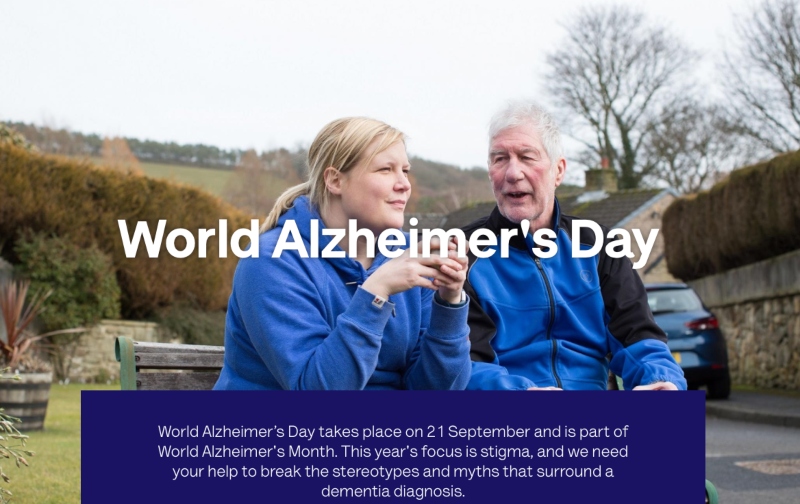Why we still know so little about dementia
The stigmatisation and misinformation that surrounds dementia remains a global problem, that requires global action, states the website of the World Alzheimer’s Day (21 September).
In the UK stigma has been reduced but the dread surrounding dementia is still high. The biggest hope, and the biggest myth-buster, is having accurate information and acting on it, writes Louise Morse

A woman whose husband had died from the disease raged to me that she had been woefully ignorant and unprepared because no real information was ‘out there’. Yet there are thousands of books, websites and media stories about dementia, but like most of us, she had ignored them until the disease impacted her life. Perhaps it’s understandable, because who wants to read about a disease that is among the most dreaded of all? It’s this ‘not knowing’ that has led to increased fear, misunderstandings and myths about dementia.
Time and again I’m surprised at how little is known about the disease. If I had a £ for every time I’ve been asked, is Dementia the same as Alzheimer’s, my wallet would be bulging. No it isn’t, is the answer. Dementia is the name given to the symptoms that result from physical damage to the brain and although Alzheimer’s disease is the biggest, it is just one of around 100 causes. I was amazed to find some ethnic groups put dementia down to demonic possession.
It was to discover the facts about dementia that I chose it as the topic for my Master’s research (I’m a Cognitive Behavioural Therapist) and wrote the first of a series of books about it. Could it Be Dementia: Losing your mind doesn’t mean losing your soul’ was one of the few to put the understanding of dementia within a Christian context and showed that the person remains, however much the individual appears to change as the disease progresses. There are well documented cases of times when the person regains lucidity, with faculties that had appeared to be lost. In Christians, this is often prompted by worship, or reading Scripture. ‘It was lovely to hear Joan again,’ a carer told me, after reading a devotion from Worshipping with Dementia.
Eleven years ago the dread of dementia was equal to that of cancer 25 years earlier, and predictions were that as cancer became more treatable and the dread diminished, so it would with dementia. But there is still no pharmaceutical cure, although the few medications available do make life changing differences for many.
But good things are happening. In our educated Western world many myths have been demolished. We know that dementia is a physical disease and not an inevitable part of ageing. A 35 year long study of men living in the Caerphilly vale showed that those who stuck to the healthy living guidelines saw the risk of dementia more than halved, at 57 per cent.
We know, too, that the numbers of new cases in the general population are declining although this is not blazoned through the media as well as it should be. The figure of 850,000 for those living with dementia is commonly quoted but the number of actual diagnoses is 537,097. Why the big difference? The higher figure is from projections made in the 1980s that have not been realised, and do not take into account the fall of new cases of dementia in the general population over the last two decades. The figures do not reflect the results of changes in life expectancy, living conditions, and improvements in health care and lifestyle, says Professor Carol Brayne, of public health medicine at the Cambridge Institute of Public Health.
The biggest hope, and the biggest myth-buster, is having accurate information and acting on it.
------
Louise Morse is media and external relations for 212 year old Christian charity, the Pilgrims’ Friend Society, founded in 1807 to give practical and spiritual support to older people. Today it operates retirement housing and care homes, and shares its knowledge with faith other organisations so that they in turn enable older people to live fulfilled lives.
Louise is author of
-
Could it be Dementia? Losing your mind doesn’t mean losing your soul 2008, Lion Monarch.
-
Dementia: Frank and Linda’s Story – new understanding, new approaches, new hope 2010, Lion Monarch.
-
Worshipping with Dementia 2010, Lion Monarch
-
Dementia: Pathways to Hope, practical and spiritual insights 2015, Lion Monarch
-
Dementia from the Inside: a doctor’s personal journal of hope, with Dr Jennifer Bute 2018, SPCK
-
Also, What’s Age Got To Do With It?, about God’s purpose for the later years 2010, Lion Monarch.
Visit the Alzheimer's Society for more information
Do you have a view? Share your thoughts via our letters' page.
Baptist Times, 20/09/2019